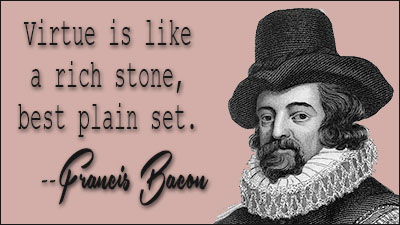FRANCIS BACON QUOTES II
English philosopher (1561-1626)

Notice: Undefined variable: id in /hermes/walnacweb03/walnacweb03ak/b2149/pow.notablequote/htdocs/b/includes/quoter.php on line 25
Ambition is like choler; which is an humor that maketh men active, earnest, full of alacrity, and stirring, if it be not stopped. But if it be stopped, and cannot have his way, it becometh adust, and thereby malign and venomous.
SIR FRANCIS BACON
Notice: Undefined variable: id in /hermes/walnacweb03/walnacweb03ak/b2149/pow.notablequote/htdocs/b/includes/quoter.php on line 35
"Of Ambition" Essays
Notice: Undefined variable: id in /hermes/walnacweb03/walnacweb03ak/b2149/pow.notablequote/htdocs/b/includes/quoter.php on line 61
If a man will begin with certainties, he shall end in doubts; but if he will be content to begin with doubts, he shall end in certainties.
FRANCIS BACON
Advancement of Learning
It is in life as it is in ways, the shortest way is commonly the foulest, and surely the fairer way is not much about.
FRANCIS BACON
Advancement of Learning
A man must make his opportunity, as oft as find it.
FRANCIS BACON
Advancement of Learning
Hope is a good breakfast, but it is a bad supper.
FRANCIS BACON
Apothegms
Silence is the virtue of fools.
FRANCIS BACON
De Augmentis Scientiarum
Riches are a good handmaid, but the worst mistress.
FRANCIS BACON
De Augmentis Scientiarum
Hurl your calumnies boldly; something is sure to stick.
FRANCIS BACON
De Augmentis Scientiarum
Children sweeten labours, but they make misfortunes more bitter.
FRANCIS BACON
Essays
All colours will agree in the dark.
FRANCIS BACON
Essays
A man that studieth revenge keeps his own wounds green.
FRANCIS BACON
Essays
As the births of living creatures at first are ill-shapen, so are all innovations, which are the births of time.
FRANCIS BACON
Essays
He that hath wife and children hath given hostages to fortune; for they are impediments to great enterprises, either of virtue or mischief.
FRANCIS BACON
Essays
Fame is like a river, that beareth up things light and swollen, and drowns things weighty and solid.
FRANCIS BACON
Essays
Riches are for spending.
FRANCIS BACON
Essays
Virtue is like a rich stone, best plain set.
FRANCIS BACON
Essays
There is no excellent beauty that hath not some strangeness in the proportion.
FRANCIS BACON
Essays
A little philosophy inclineth man's mind to atheism, but depth in philosophy bringeth men's minds about to religion.
FRANCIS BACON
Essays
Prosperity is the blessing of the Old Testament, adversity is the blessing of the New.
FRANCIS BACON
Essays
It is a miserable state of mind to have few things to desire and many things to fear.
FRANCIS BACON
Essays